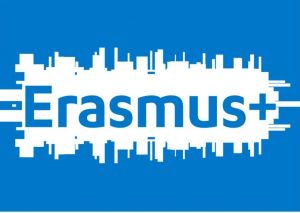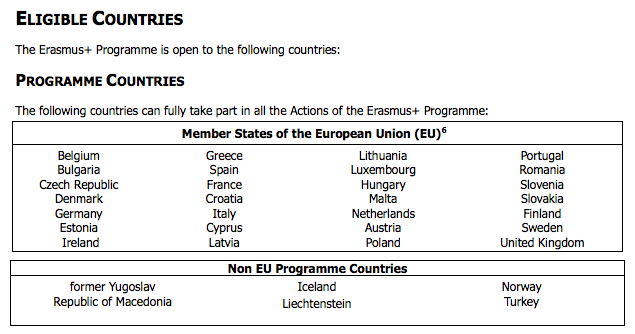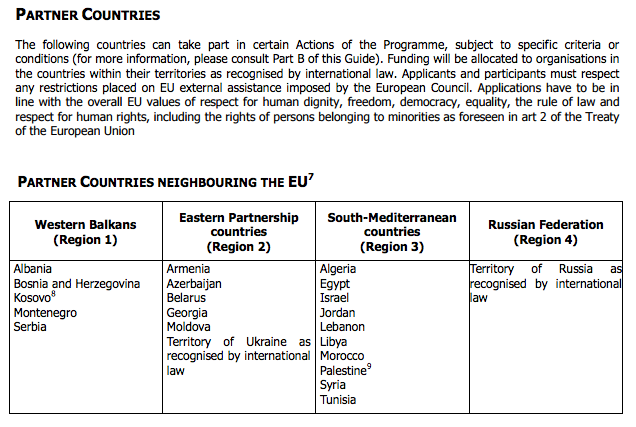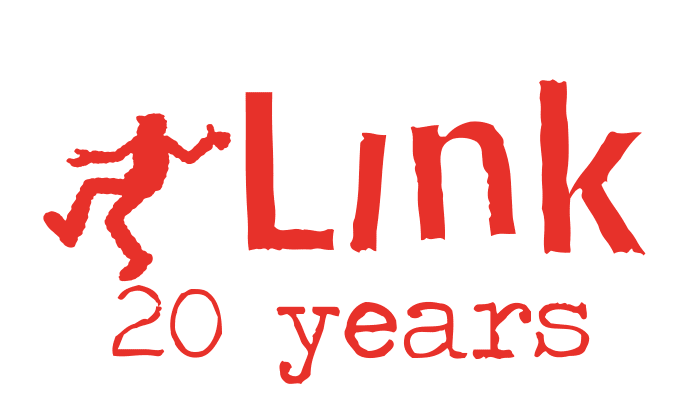
Erasmus+ is the EU Programme in the fields of education, training, youth and sport for the period 2014-20201 . Education, training, youth and sport can make a major contribution to help tackle socio-economic changes, the key challenges that Europe will be facing until the end of the decade and to support the implementation of the Europe 2020 strategy for growth, jobs, social equity and inclusion. Too many young people leave school prematurely running a high risk of being unemployed and socially marginalised. Fighting rising levels of unemployment - particularly among young people - has become one of the most urgent- tasks for European governments. The same risk threatens many adults with low skills.
The Erasmus+ Programme is designed to support Programme Countries' efforts to efficiently use the potential of Europe’s human talent and social capital, while confirming the principle of lifelong learning by linking support to formal, non-formal and informal learning throughout the education, training and youth fields. The Programme also enhances the opportunities for cooperation and mobility with Partner Countries, notably in the fields of higher education and youth. In accordance with one of the new elements introduced in the Lisbon Treaty, Erasmus+ also supports activities aiming at developing the European dimension in sport, by promoting cooperation between bodies responsible for sports. The Programme promotes the creation and development of European networks, providing opportunities for cooperation among stakeholders and the exchange and transfer of knowledge and know-how in different areas relating to sport and physical activity. This reinforced cooperation will notably have positive effects in developing the potential of Europe’s human capital by helping reduce the social and economic costs of physical inactivity. Overall the Programme supports actions, cooperation and tools consistent with the objectives of the Europe 2020 Strategy and its flagship initiatives, such as Youth on the Move and the Agenda for new skills and jobs. The Programme also contributes to achieve - through the Open Methods of Coordination - the objectives of the Education and Training Strategic Framework and of the European Youth Strategy. This investment in knowledge, skills and competences will benefit individuals, institutions, organisations and society as a whole by contributing to growth and ensuring prosperity and social inclusion in Europe and beyond.
Objectives
The Erasmus+ Programme shall contribute to the achievement of:
- the objectives of the Europe 2020 Strategy, including the headline education target2 ;
- the objectives of the strategic framework for European cooperation in education and training (ET 2020);
- the sustainable development of Partner Countries in the field of higher education;
- the overall objectives of the renewed framework for European cooperation in the youth field (2010-2018);
- the objective of developing the European dimension in sport, in particular grassroots sport, in line with the EU work plan for sport;
- the promotion of European values in accordance with Article 2 of the Treaty on the European Union3.

The structure of Erasmus +
KEY ACTION 1 – MOBILITY OF INDIVIDUALS
This Key Action supports:
- Mobility of learners and staff: opportunities for students, trainees, young people and volunteers, as well as for professors, teachers, trainers, youth workers, staff of education institutions and civil society organisations to undertake a learning and/or professional experience in another country;
- Erasmus Mundus Joint Master Degrees: high-level integrated international study programmes delivered by consortia of higher education institutions that award full degree scholarships to the best master students worldwide;
- Erasmus+ Master Degree Loans: higher education students from Programme Countries can get a loan backed up by the Programme to go abroad for a full Master Degree. Students should address themselves to national banks or student loan agencies.
KEY ACTION 2 – COOPERATION FOR INNOVATION AND THE EXCHANGE OF GOOD PRACTICES
This Key Action supports:
- Transnational Strategic Partnerships aimed to develop initiatives addressing one or more fields of education training and youth and promote innovation, exchange of experience and know-how between different types of organisations involved in education, training and youth or in other relevant fields. Certain mobility activities are supported in so far as they contribute to the objectives of the project;
- Knowledge Alliances between higher education institutions and enterprises which aim to foster innovation, entrepreneurship, creativity, employability, knowledge exchange and/or multidisciplinary teaching and learning;
- Sector Skills Alliances supporting the design and delivery of joint vocational training curricula, programmes and teaching and training methodologies, drawing on evidence of trends in a specific economic sector and skills needed in order to perform in one or more professional fields;
- Capacity Building projects supporting cooperation with Partner Countries in the fields of higher education and youth. Capacity Building projects aim to support organisations/institutions and systems in their modernisation and internationalisation process. In certain eligible Partner Countries mobility activities are supported in so far as they contribute to the objectives of the project;
- IT support platforms, such as eTwinning, the European Platform for Adult Learning (EPALE) and the European Youth Portal, offering virtual collaboration spaces, databases of opportunities, communities of practice and other online services for teachers, trainers and practitioners in the field of school and adult education as well as for young people, volunteers and youth workers across Europe and beyond.
KEY ACTION 3 – SUPPORT FOR POLICY REFORM
This Key Action supports:
- Knowledge in the fields of education, training and youth for evidence-based policy making and monitoring in the framework of Europe 2020, in particular: o country-specific and thematic analysis, including through cooperation with academic networks; o peer learning and peer reviews through the Open Methods of Coordination in education, training and youth;
- Initiatives for policy innovation to stimulate innovative policy development among stakeholders and to enable public authorities to test the effectiveness of innovative policies through field trials based on sound evaluation methodologies;
- Support to European policy tools to facilitate transparency and recognition of skills and qualifications, as well as the transfer of credits, to foster quality assurance, support validation of non-formal and informal learning, skills management and guidance. This Action also includes the support to networks that facilitate cross-European exchanges, the learning and working mobility of citizens as well as the development of flexible learning pathways between different fields of education, training and youth;
- Cooperation with international organisations with highly recognised expertise and analytical capacity (such as the OECD and the Council of Europe), to strengthen the impact and added value of policies in the fields of education, training and youth;
- Stakeholder dialogue, policy and Programme promotion with public authorities, providers and stakeholders in the fields of education, training and youth are necessary for raising awareness about Europe 2020, Education and Training 2020, the European Youth Strategy and other European sector-specific policy agendas, as well as the external dimension of EU education, training and youth policies. They are essential to develop the capacity of stakeholders to concretely support the implementation of policies by stimulating the effective exploitation of the Programme results and generating tangible impact.

JEAN MONNET ACTIVITIES
The Jean Monnet Activities will support:
- Academic Modules, Chairs, Centres of Excellence in order to deepen teaching in European integration studies embodied in an official curriculum of a higher education institution, as well as to conduct, monitor and supervise research on EU content, also for other educational levels such as teacher training and compulsory education. These Actions are also intended to provide in-depth teaching on European integration matters for future professionals in fields which are in increasing demand on the labour market, and at the same time aim at encouraging, advising and mentoring the young generation of teachers and researchers in European integration subject areas;
- Policy debate with academic world, supported through: a) Networks to enhance cooperation between different universities throughout Europe and around the world, foster cooperation and create a high knowledge exchange platform with public actors and the Commission services on highly relevant EU subjects; b) Projects for innovation and cross-fertilisation and spread of EU content aimed to promote discussion, reflection on EU issues and to enhance knowledge about the EU and its processes;
- Support to institutions and associations, to organise and carry out statutory activities of associations dealing with EU studies and EU issues, and to publicize EU facts among a wider public enhancing active European citizenship. Jean Monnet Activities also provide operating grants to designated institutions which pursue an aim of European interest;
- Studies and conferences with the purpose of providing policy-makers with new insights and concrete suggestions via critical independent academic views, and to reflect on current issues of the EU, in particular through the annual major international conference on highly political subjects with the participation of policymakers, civil society and top-level academics.
SPORT
Actions in the field of sport will support:
- Collaborative Partnerships, aimed at promoting the integrity of Sport (anti-doping, fight against match fixing, protection of minors), supporting innovative approaches to implement EU principles on good governance in sport, EU strategies in the area of social inclusion and equal opportunities, encouraging participation in sport and physical activity (supporting the implementation of EU Physical Activity Guidelines, volunteering, employment in sport as well as education and training in sport), and supporting the implementation of the EU guidelines on dual careers of athletes;
- Not-for-profit European sport events, granting individual organisations in charge of the preparation, organisation and follow-up to a given event. The activities involved will include the organisation of training activities for athletes and volunteers in the run-up to the event, opening and closing ceremonies, competitions, side-activities to the sporting event (conferences, seminars), as well as the implementation of legacy activities, such as evaluations or follow-up activities; Part A – What is the structure of the Programme 17
- Strengthening of the evidence base for policy making through studies; data gathering, surveys; networks; conferences and seminars which spread good practices from Programme Countries and sport organisations and reinforce networks at EU level so that national members of those networks benefit from synergies and exchanges with their partners;
- Dialogue with relevant European stakeholders, being mainly the annual EU Sport Forum and support to Sport Presidency events organised by the EU Member States holding the Presidency of the EU. Other adhoc meetings and seminars.
Who can participate in Erasmus+?
Individuals - students, trainees, apprentices, pupils, adult learners, young people, volunteers, professors, teachers, trainers, youth workers, professionals of organisations active in the fields of education, training and youth constitute the main target population of the Programme. However, the Programme reaches these individuals through organisations, institutions, bodies or groups that organise such activities. The conditions of access to the Programme therefore relate to these two actors: the "participants" (individuals participating in the Programme) and the "participating organisations" (including groups of at least four young people active in youth work but not necessarily in the context of youth organisations, also referred to as informal groups of young people). For both participants and participating organisations, the conditions for participation depend on the country in which they are based.
Participants
As a general rule, participants in Erasmus+ projects must be established in a Programme Country. Some Actions, notably in the fields of higher education and youth, are also open to participants from Partner Countries. The specific conditions for participating in an Erasmus+ project depend on the type of Action concerned. In general terms:
- For projects relevant for the field of higher education, the main targets are: higher education students (short cycle, first, second or third cycle), higher education teachers and professors, staff of higher education institutions, trainers and professionals in enterprises;
- For projects relevant for the field of vocational education and training, the main targets are: apprentices and students in vocational education, professionals and trainers in vocational training, staff of initial vocational education organisations, trainers and professionals in enterprises;
- For projects relevant for the field of school education, the main targets are: school leaders, school teachers and school staff, pupils in pre-primary, primary and secondary education;
- For projects relevant for the field of adult education, the main targets are: members of adult education organisations, trainers, staff and learners in adult education;
- For projects relevant for the youth field the main targets are: young people from 13 to 305 , youth workers, staff and members of organisations active in the youth field;
- For projects relevant to the field of sport, the main targets are: professionals and volunteers in the field of sport, athletes and coaches.
Organizations
Erasmus+ projects are submitted and managed by participating organisations representing the participants. If a project is selected, the applicant participating organisation becomes a beneficiary of an Erasmus+ grant. Beneficiaries sign a grant agreement or receive a grant decision which entitles them to receive financial support for the realisation of their project (grant agreements are not offered to individual participants). Some Actions of the Programme are also open to informal groups of young people. As a general rule, organisations participating in Erasmus+ projects must be established in a Programme Country. Some Actions are also open to participating organisations from Partner Countries, notably in the field of higher education and youth. The specific conditions for participating in an Erasmus+ project depend on the type of Action supported by the Programme. In general terms, the Programme is open to any organisation active in the fields of education, training, youth or sport. Several Actions are also open to the participation of other players in the labour market.


For more information please read the Programme Guide





